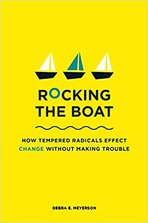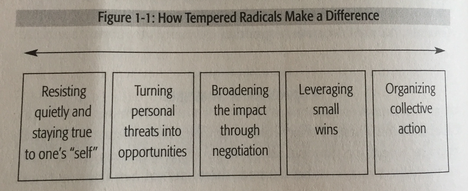Rocking The Boat: How to Effect Change Without Making Trouble
Task Zero.
In her book Rocking The Boat: How to effect change with ought making trouble, Debra E Meyerson focused on researching different environments in which people are trying to stand up for themselves in one way or another. Debra was able to find that people within different organizations, cultures, values, and sexual orientation were all on a range of what she calls “Tempered Radicals”. These people all in one way or another are pushing towards a change that they want to see.
In her book, she calls “Tempered Radicals” people that want change within their organizations yet they are successful in their everyday’s job. The changes or their agendas can be as small as placing green recycle bins under everyone’s desk, to as big as organizing collective actions.
Task One.
Debra E. Meyerson identifies three primary ways people experience “difference” from the majority:
-Those who have different social identities from he majority and see those differences as setting them apart and excluding them from the mainstream.
-Those who have different social identifies and see those differences as merely cultural and not a basis for exclusion
-Those who have not cultural but philosophical differences, which conflict with the prevailing values, beliefs, and agendas operating in their organizations.
It is important to mention, that Debra refers to Social Identify as how a person defines his or her “self” as a member of a larger enduring social group based on ethnicity, race, gender, sexual orientation or religion.
I have found myself in “different different” over the years. In high school, as an immigrant from Poland, attending the North Shore, higher class, very affluent school, I was defiantly the first different. I stood out next to my peers, however because I wanted to fit-in and and be a part of the mainstream, I became a member of numerous sporting clubs and academic and non-academic clubs. Throughout my college and early career years, I see how I was the second different. I have assimilated to the new country, schooling system and life and was able to see how my cultural background and previous experiences just add to my personality and charisma, and not a basis for exclusion. Now, I see that as a member of a big organization, like being a Urban School teacher, I face many daily conflicts that are against what I believe the school system should support and embody.
Task Two.
Debra E. Meyerson shows us a continuum in which I can place myself within different levels, depending on what the agenda is, how it relates to me and my students and how important it is to the future of my professional life or my students’ future. Most of the time, I am given a lot of freedom in which I get to organize collective action and it is very successful. However, there comes a time in which all the teachers are asked to do something specific. When I know, that this specific thing does not really pertain to my area of teaching, and takes away from what I know I should be doing with my students, based on my experience and knowledge, I take the quiet route and stay true to myself. I want to point out that it is not due to the fact that I am resisting change, because I am all up for change, I think change is good. However, when I am given a task that I know is beneficial in other classes, but not necessarily mine, I need to use my professional knowledge to just quietly stay true to myself. I have tried to negotiate and speak up against specific idea, however, I was turned down. Therefore, I am quietly resisting, and staying true to what I believe is the best for the students in my classroom.
Task Three.
In Rocking the Boat, Debra talks about 4 levels of challenges.
However, when it comes to the whole school organization, such as Urban Teaching, there are constantly troubles with budget and really looking at what matters for our students’ future. Therefore, I can assimilate to the 4th level of challenge. It is very tiring to always have a target on your back, and to hear, “Oh, you teach in the city, huh”. The public urban education has been facing many challenges over the past years and I am hoping that some sort of collective action will happen to help the future of our country, which are out students.
In her book Rocking The Boat: How to effect change with ought making trouble, Debra E Meyerson focused on researching different environments in which people are trying to stand up for themselves in one way or another. Debra was able to find that people within different organizations, cultures, values, and sexual orientation were all on a range of what she calls “Tempered Radicals”. These people all in one way or another are pushing towards a change that they want to see.
In her book, she calls “Tempered Radicals” people that want change within their organizations yet they are successful in their everyday’s job. The changes or their agendas can be as small as placing green recycle bins under everyone’s desk, to as big as organizing collective actions.
Task One.
Debra E. Meyerson identifies three primary ways people experience “difference” from the majority:
-Those who have different social identities from he majority and see those differences as setting them apart and excluding them from the mainstream.
-Those who have different social identifies and see those differences as merely cultural and not a basis for exclusion
-Those who have not cultural but philosophical differences, which conflict with the prevailing values, beliefs, and agendas operating in their organizations.
It is important to mention, that Debra refers to Social Identify as how a person defines his or her “self” as a member of a larger enduring social group based on ethnicity, race, gender, sexual orientation or religion.
I have found myself in “different different” over the years. In high school, as an immigrant from Poland, attending the North Shore, higher class, very affluent school, I was defiantly the first different. I stood out next to my peers, however because I wanted to fit-in and and be a part of the mainstream, I became a member of numerous sporting clubs and academic and non-academic clubs. Throughout my college and early career years, I see how I was the second different. I have assimilated to the new country, schooling system and life and was able to see how my cultural background and previous experiences just add to my personality and charisma, and not a basis for exclusion. Now, I see that as a member of a big organization, like being a Urban School teacher, I face many daily conflicts that are against what I believe the school system should support and embody.
Task Two.
Debra E. Meyerson shows us a continuum in which I can place myself within different levels, depending on what the agenda is, how it relates to me and my students and how important it is to the future of my professional life or my students’ future. Most of the time, I am given a lot of freedom in which I get to organize collective action and it is very successful. However, there comes a time in which all the teachers are asked to do something specific. When I know, that this specific thing does not really pertain to my area of teaching, and takes away from what I know I should be doing with my students, based on my experience and knowledge, I take the quiet route and stay true to myself. I want to point out that it is not due to the fact that I am resisting change, because I am all up for change, I think change is good. However, when I am given a task that I know is beneficial in other classes, but not necessarily mine, I need to use my professional knowledge to just quietly stay true to myself. I have tried to negotiate and speak up against specific idea, however, I was turned down. Therefore, I am quietly resisting, and staying true to what I believe is the best for the students in my classroom.
Task Three.
In Rocking the Boat, Debra talks about 4 levels of challenges.
- The difficulties of ambivalence
- The incremental lures of co-optation
- Potential damage to their reputation
- Frustration and burnout
However, when it comes to the whole school organization, such as Urban Teaching, there are constantly troubles with budget and really looking at what matters for our students’ future. Therefore, I can assimilate to the 4th level of challenge. It is very tiring to always have a target on your back, and to hear, “Oh, you teach in the city, huh”. The public urban education has been facing many challenges over the past years and I am hoping that some sort of collective action will happen to help the future of our country, which are out students.


